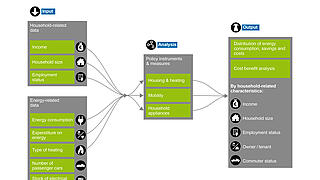The EU is committed to reducing its climate-damaging greenhouse gases by at least 55% by 2030 compared to 1990 levels, as agreed in the trilogue on the European Green Deal. The Council of the European Union and the European Parliament thus acted on the European Commission’s proposals, set out in the Fit for 55 package, to introduce more ambitious climate targets and regulatory and market-based instruments. The main objectives are to boost energy efficiency in the EU, accelerate the expansion of renewable energies, establish more stringent emissions standards for passenger cars, build more climate change mitigation into land use, and reform and extend emissions trading.
The Oeko-Institut supports these processes by sharing its in-depth scientific expertise. For example, the researchers monitor the negotiations and legislative process and provide support to the European Commission, the European Parliament and the European Environment Agency (EEA) in the form of comprehensive analyses and assessments. They also monitor progress towards national and European climate targets and determine whether additional measures are required and what effect they may have. In addition, they identify the impacts of failure to meet climate targets, e.g. in the transport and building sectors, and calculate the associated costs to the German government.
![[Translate to English:] © Öko-Institut](/fileadmin/_processed_/0/d/csm_Energiewende-Klimapolitik-EU_%C3%96ko-Institut_4eab3914d1.jpg)






![Preview of PDF File [Translate to English:]](/fileadmin/_processed_/8/0/csm_EU-ETS-and-2040-climate-target_a56904f4f7.png)




